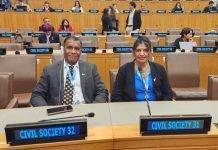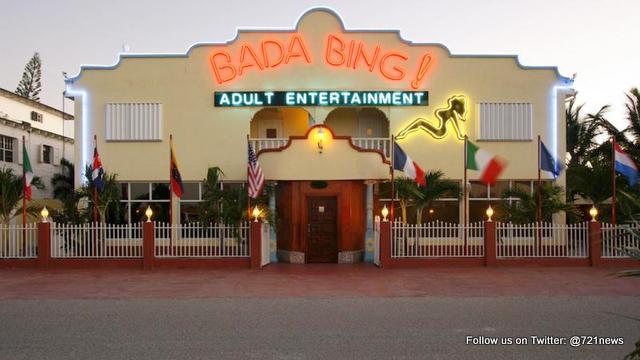Stop on work permits forces brothel out of business
By the TODAY Newspaper
GREAT BAY – Five days from now, Bada Bing will close down, the club’s attorney Jairo Bloem said yesterday during a civil court hearing. Later the attorney said that by half May, most of the other clubs will be half empty. All this is the result of a decision by the government not to issue any new work permits for prostitutes from abroad, based on the argument that it does not want to facilitate human trafficking.
Nine so-called adult entertainment clubs took the government to court over the work permit issue. Judge Katja Mans will not, as is usual with summary proceedings, issue a ruling within a week. Instead she suggested that the opposing parties come together and also involve the prosecutor’s office to see if they can work something out to solve the situation.
“There are days when I am happy not to be in politics,” the judge said at the end of yesterday’s proceedings. “This is a difficult issue whereby we have to consider the reality.”
Mans mentioned the protection of local girls as one of the points of departure for the government’s prostitution policy but noted that on the other hand women also are entitled to self-determination,
She hinted that possible solutions could lead to a situation whereby “the surgery has succeeded, but the patient has died.” Currently, the government has a clear view of prostitution activities on the island and it is therefore relatively easy to exercise control. “If you smother the industry, you lose your grip on the situation,” she said. “Exploitation could be counter-acted with conditions but I admit, I do not have all the answers. That is up to local politics. If women are not allowed to come here anymore what will then happen with prostitution?”
Judge Mans asked country attorney Richard Gibson Jr. what the status is of the policy the government has under consideration. “I can tell you that the government is working on it,” Gibson said, “But I cannot tell you that the government is ready with it.”
When the court finally set May 13 as the date to meet again in court – after consultation between parties – the club’s attorney Jairo Bloem noted that by then Bada Bing will have been closed for two weeks, and that most of the other clubs would be half empty, due to a lack of girls.
Bloem told the court that the clubs have submitted request for permits based on the existing policy, but that they have all been denied by the Minister of labor, Emil Lee. “The government says that it would facilitate human trafficking by issuing permits,” the attorney said. “But the existing policy has not been withdrawn. All requests have been turned down and they are not even being handled anymore.”
Bloem said that the government bases its decisions on the contention that issuing permits for prostitution results in human trafficking, whereas the existing policy is designed to prevent this,
In December the government decided to put an immediate stop to work permits for foreign prostitutes. The acting Minister of Justice at the time, Richard Gibson Sr., said that under a new policy, women who want to work as prostitutes in St. Maarten would have to apply for their work permits. Until then, the clubs had done this.
But that new policy is still not there. “We are five months further,” Bloem said, “And the new policy is not in sight yet.”
The attorney warned that, if the sex industry is brought to a halt, “there will be other problems the government is not waiting for either.” He noted that the government collects considerable revenue from “more than a thousand prostitutes a year” at $1,280 per head.
Bloem’s opposing counsel Richard Gibson Jr. told the court that the country “cannot be forced to cooperate with human trafficking.” He referred to the European Human Rights Treaty and the Geneva Convention. “It is a fact that the clubs recruit women abroad and by doing so they are busy with human trafficking.”
“Issuing work permits is a direct violation of international regulations,” Gibson said. “The court cannot order the country to commit acts that are not focused on combating human trafficking. The ban on human trafficking is absolute and it is not possible to call on exceptions.”
Gibson conceded that the court could order the country to handle the requests for work permits. “But the chance is real that they will all be rejected,” he said.
The country’s attorney objected to the penalty the clubs demand in their petition to the court – $10,000 per rejected work permit. “That is excessive,” he said.
Gibson noted furthermore that the prostitution policy has been withdrawn and that the rejections of the work permits have been properly motivated. Since the government decided to stop issuing the work permits, the clubs have submitted 63 requests. Some of them have been rejected, while the others have not been handled.






























